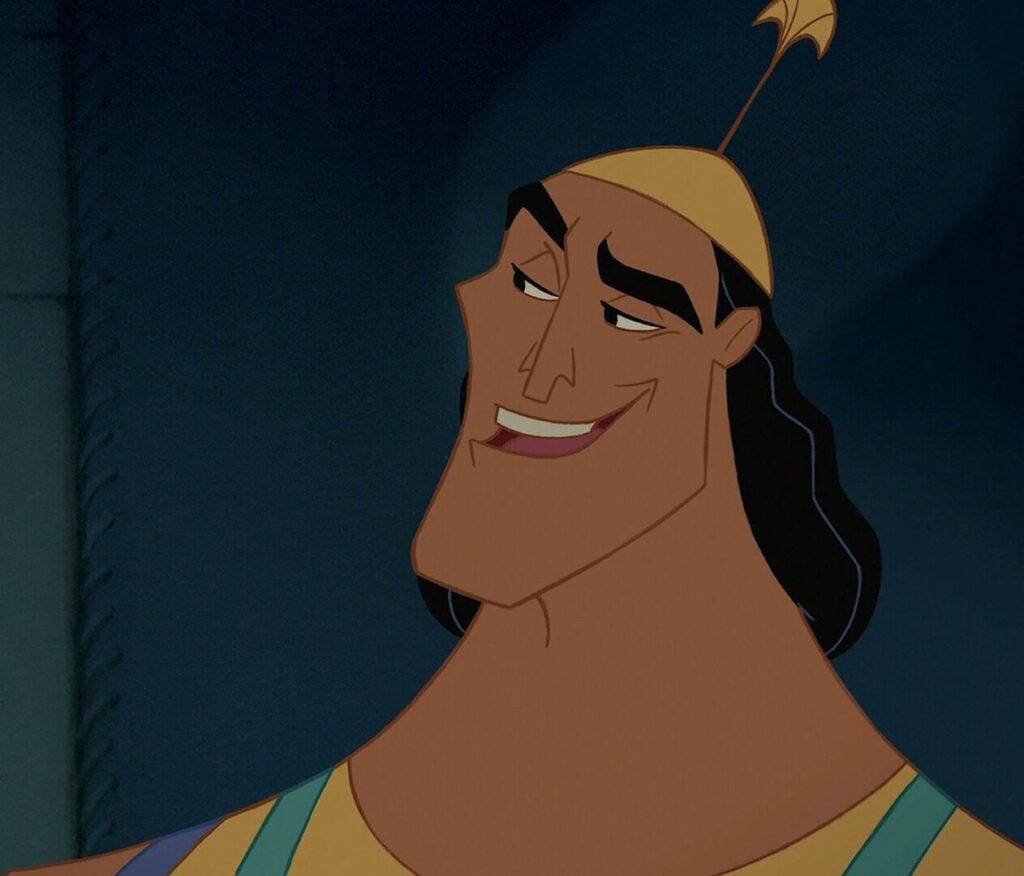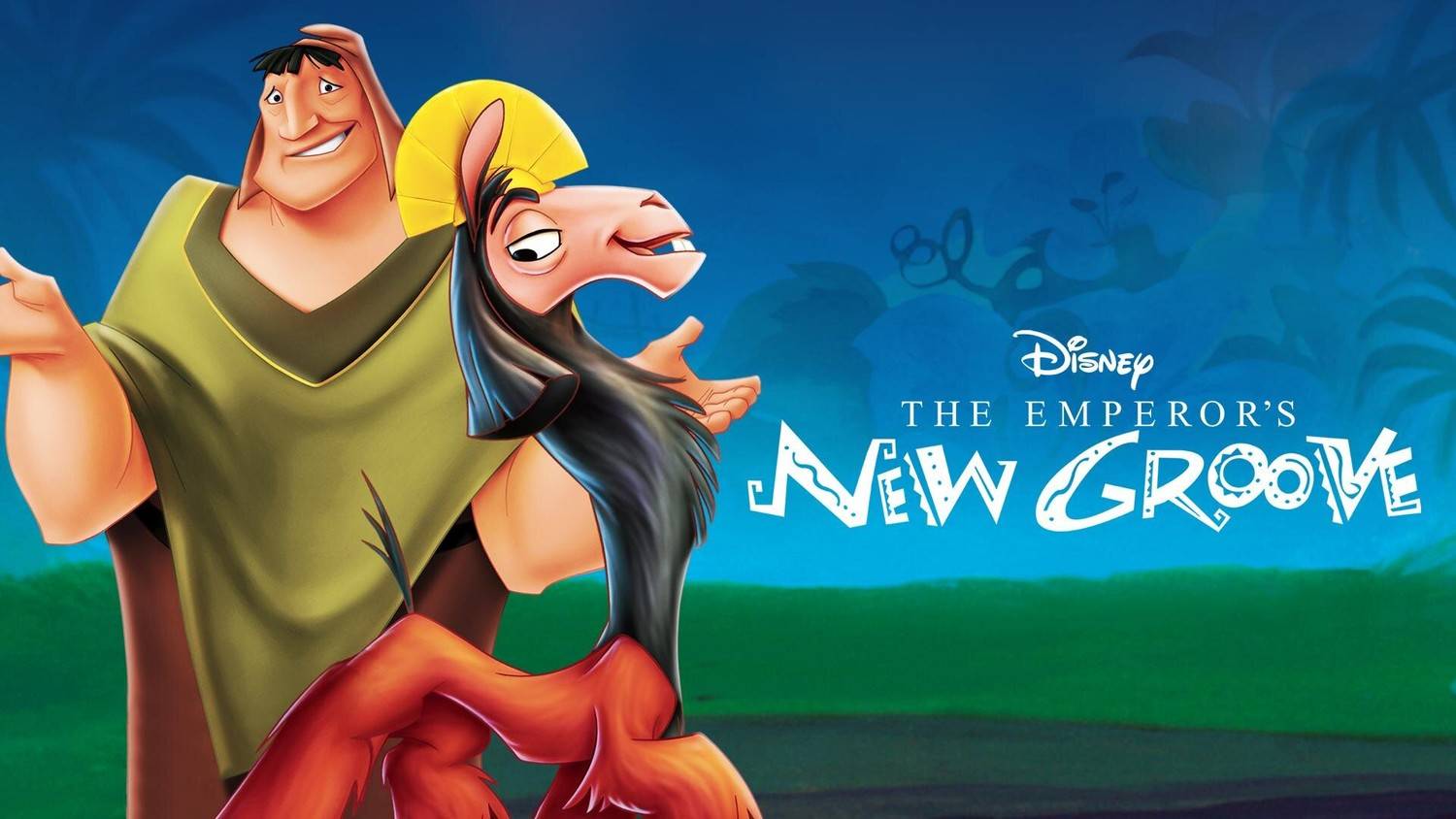I just watched Disney’s The Emperor’s New Groove, which was quite the experience, mainly because I now have the context of what Disney did afterward. I can see how The Emperor’s New Groove made some great contributions to the animated film industry, and some really terrible ones that poisoned basically every Disney production since then. The Emperor’s New Groove was released in 2000, when I was 11, when I was still a kid and watched it as a kid. Watching it as an adult, with the context of later Disney films, particularly after they bought Marvel, was quite different.
The Emperor’s New Groove was the last Disney 2D animated film before they fired the entire department and switched to 3D features. There were two more 2D films that hired artists on a temporary basis, The Princess and the Frog (2009) and Winnie the Pooh (2011), but The Emperor’s New Groove was effectively the end of the Disney 2D studio system, the end of an era.
The movie is about 80 minutes, a little short by American standards, but it’s snappy with almost no musical sequences to pad the run time. There’s a standard formulaic Disney plot but it’s done creatively. As far as Disney plots go, I would say that this one is one of the most interesting. The Emperor’s New Groove, intentionally or not, is an ancient story. In the Book of Daniel, Babylonian King Nebuchadnezzar is a cruel and selfish ruler. Then God drives Nebuchadnezzar insane and he is forced to live as animal for seven years – he apparently didn’t literally turn into an animal, he just acted like one, which must have been bewildering and scary to everyone watching. The experience humbles Nebuchadnezzar, and he becomes a good and kind king as a result of it. So The Emperor’s New Groove had the same potential.
But…
There’s the jokes.
To be clear, the jokes are great, they’re all well written, everything about this movie is well written. The problem isn’t that the jokes aren’t well written or funny, there’s just too many of them. The Emperor’s New Groove has serious, powerful moments in the plot, but sabotages itself by compulsively inserting a joke every 20-30 seconds. Earlier Disney entries like The Little Mermaid and The Lion King had serious, even tragic moments. Basically every American kid can remember that moment when Simba’s dad, Mufasa, was betrayed and murdered by his brother. Even childish cartoons can have Shakespearean levels of tragedy, and that makes them better. Art is all about contrast, so taking the audience on a roller coaster ride from serious tragedy to comedy in logical steps makes for a better experience. The Emperor’s New Groove had these moments too, but killed the mood with jokes that weren’t necessary.
Typically, Disney movies up to this point had one designated character for comic relief, while everyone else acted seriously. In The Emperor’s New Groove, that comedic character was Kronk, voiced by Patrick Warburton, one of the most iconic voice actors in all of cinematic history. But unfortunately, in this movie, everyone is comedic relief, and says silly things whether or not it helps the plot and mood of the scene. Ironically, Kronk is allowed to have his own character arc and serious moments, which is part of what makes him such a good and loveable character. He has more serious moments than the actual main character.

Emperor Kuzco is Nebuchadnezzar. He’s a selfish monarch who declares his intent to destroy a peasant village to make way for a summer vacation home. Then his traitorous advisor, Yzma, turns him into a llama. It’s a great redemption arc, but he’s not allowed to have any serious moments without jokes. The irony, as I mentioned already, is that almost all of the serious moments go to the village idiot Kronk. I particularly like the scenes when Kronk decides not to murder the unconscious llama Kuzco when he was ordered to, and later when he decides to betray his boss after he realizes she’s a terrible person. Kronk’s problem is that he’s really stupid (not his fault he was born that way) and doesn’t understand his actions hurt people. He never intentionally hurts anyone, and when he does realize he’s hurting someone, he prevents it – even at personal risk and sacrifice for himself. This is what makes Kronk a great character.
Maybe this is just me, but I admire stupid characters when portrayed correctly. One time I wrote a sci-fi novel about a super soldier, “Hanson,” a guy from a humble background who, through no fault of his own, is just really stupid. He knows he’s stupid and is extremely self-conscious about it. Even simple situations are extremely complex for Hanson, and he knows when people think he’s stupid and are being condescending. But he manages the best he can.
Another somewhat related problem is that The Emperor’s New Groove just has a bunch of modern American characters playing pretend that they are in the ancient Mayan Empire. I’m not expecting Disney to recreate Mayan civilization, but I would at least like them to think about how a real monarchy would work, particularly because it directly affects the plot. Nobody treats Kuzco as the emperor, he’s not even a president or a CEO, just a regular guy at a pub and that hurts the story. If an American office worker treated his boss the way people treat Kuzco, he would be fired on the spot. No real emperor would tolerate pathetic common people talking to him like he’s their buddy. Japanese samurai would chop off peoples’ heads just for failing to bow in their presence, which is roughly how all feudal cultures treated the relationship between pathetic commoners and nobility, though not always to that extreme. It’s really convenient for a nobleman to carry a sword, just in case he needs to behead some disrespectful peasants!
There is a scene in The Emperor’s New Groove when Kuzco orders a random old beggar thrown out the window for accidentally bumping into him, but unfortunately, this is just a throwaway joke and the movie isn’t consistent about how citizens are supposed to respect him. If all of the other characters were equally terrified of accidentally touching or offending Kuzco, that would explain why his status as the emperor is so important, and why he can get away with anything, no matter how terrible it is. He can casually maim or kill anyone in his domain just for fun, or for no reason at all.
When llama Kuzco meets the peasant elder Pacha, who he had just hours earlier told about his plan to demolish the village for a summer home, there’s no reason for Pacha to help him, or do anything except kill him. But in a real historical context, it would make a lot of sense for Pacha to assist to the best of his abilities. If Pacha was a real peasant and Kuzco was a real emperor, there would be religious devotion and fear involved. Even if Pacha hates Kuzco, he would still feel obligated to help and keep him safe. Kuzco is basically (or literally) a god, and it would be inconceivable for a lowly peasant to do anything except protect him. That context would give a lot more emotional weight to the scene when Pacha stands up to him and insists that he will only help in exchange for not destroying the village. Imagine, a pathetic peasant standing up to the emperor and daring to barter with him. Should be a great scene, but isn’t.
The problem is lack of cultural context. To a modern audience, Pacha standing up to Kuzco is meaningless because the divine relationship between emperor and peasant was never established. Being a kids’ movie is no excuse. The scene with Kuzco having his guards throw the old man out of the window was enough to show that he has terrifying power over the people; Kuzco can order a random citizen killed just because he felt like it. All that needed to be done was show that everyone is scared of him, but the script writers were too lazy or thoughtless to do this.
As I think about this more, other examples come to mind. Like when Kuzco casually turns down all of the potential brides offered to him. That shows Kuzco is selfish and doesn’t care about his duty to produce an heir to the throne. But in the movie, this is just another throwaway gag for momentary comedic effect and never mentioned again, even though it directly affects the plot. Kuzco’s traitorous advisor, Yzma, is able to seize power for the exact reason there was no heir. Even a queen with no children would presumably be a more eligible successor than an old woman with no relation to the royal family. If Kuzco had married one of those girls like he was supposed to, that would have instantly thwarted Yzma’s evil plan. One would think this would be a relevant plot point to bring up later, but it isn’t. I particularly liked the scene at the end when Yzma orders the palace guards to slaughter Kuzco and Pacha. Kuzco frantically insists that he is the emperor, but to no avail. This was an interesting lesson about dogma, and how power can be fleeting if you run afoul of this dogma, but the movie was so overlaiden with excessive humor, serious points like this were drowned out.
This is the problem with a movie that prioritizes jokes over everything else.
To sum it up, The Emperor’s New Groove is an entertaining movie, and one of the best Disney animated features (maybe in the top 10%), but it set some ugly precedents. This movie was well written, so the over-emphasis on jokes could be overlooked. But in later movies, particularly in the Marvel franchise, scripts over-emphasized jokes and were sloppily written. Movies about heroes saving the universe from genocidal Space Hitler should be at least somewhat serious, but treat it like a joke. It’s a trend that started in the year 2000 with a llama movie, it just didn’t become noticeable until a decade or so later.
Ian Kummer

All text in Reading Junkie posts are free to share or republish without permission, and I highly encourage my fellow bloggers to do so. Please be courteous and link back to the original.
I now have a new YouTube channel that I will use to upload videos from my travels around Russia. Expect new content there soon. Please give me a follow here.
Also feel free to connect with me on Quora (I sometimes share unique articles there).



Oh, actually, Kuzco was an evil dIcTaTor who learned dEmOcRaCy through bonding with people. He also acquired some capitalists business skills and built an entertainment park instead of a villa. Yzma is kinda Nulandish.